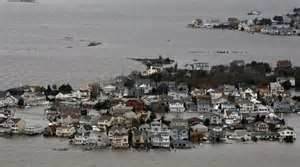|
UNITED NATIONAL ANTIWAR COALITION STATEMENT ON HURRICANE SANDY AND GLOBAL WARMING The hurricane Sandy disaster revealed much about inequality inherent in American society, and a government which is less and less willing or able to meet the needs of its citizens. Thousands of people in New York and New Jersey have waited days, in some cases weeks, to have electricity, public transportation and other needed services and infrastructure restored. Private utility companies proved themselves unable to provide power as they are licensed by the states and required to do. Residents of New York City public housing developments lived for more than two weeks without electricity, heat, or running water. As in New Orleans, the
residents, especially the poor, were last in the city government's priority
list. Power was restored to the New York Stock Exchange quickly and the mayor
wanted to use scarce resources to hold the annual marathon. The marathon was
cancelled only after very vocal political and popular protest. The promotion of
the finance and tourism industries took precedence over providing for the most
basic needs of people. In a nation which
thinks of itself as advanced, two major hospitals, New York University and
Bellevue, were forced to evacuate patients when back-up generators failed. The
evacuations exemplified the ways in which local and state governments failed to
coordinate emergency responses with communities residents and stakeholders such
as in the health care field. This city which "never sleeps" came to a standstill
because the subway system in a city surrounded by water was unprotected from the
risk of a major flood. While "first responders" are and should be part of
disaster planning, the planning is not extended to local communities and key
stakeholders, which then must fend for themselves when first responders cannot
come to their aid. While city and state
governments were unable to respond effectively to the crisis, wealthy, private
organizations such as the Red Cross were promoted as reliable charities and
received more than $100 million in donations from people anxious to help. They
too proved inadequate despite the fact they did not lack for financial
resources. The Red Cross did little with a lot, but Occupy Sandy did a lot with
nothing. Occupy activists met the needs of desperate people where government,
utilities and wealthy charities did not. If government had the will and intent
to meet human needs and an interest in planning with communities, these
charitable organizations and NGOs would be unnecessary in times of
crisis. While the suffering
continues, the inevitable cry for privatization has already begun, with disaster
capitalism always the winner when human beings are suffering. Calls to privatize
transportation networks and public housing began before the winds stopped
blowing. Appeals for federal disaster funding are politicized and met with
intransigence in congress. There must be a unified demand that this natural
disaster not be used as a pretext for cutting government services or turning
them over to private interests. There must also be a demand for thorough and
public investigations of government actions and the ways in which they did and
did not work for people in the stricken areas. It is the federal
government which should provide for citizens' needs during large scale crises
such as weather disasters. That is not possible when the U.S. military budget is
larger than the military budgets of the rest of the world combined. Nor is it
possible when the top 1% pay taxes at lower rates than the average working
person. In the words of Occupy, "End the wars, tax the rich." Those things that were
done well since this tragedy began teach important lessons about activism. When
politicians complained about the inadequate response from the Red Cross, they
miraculously appeared. When the public and politicians demanded a cancellation
of the New York City Marathon, they succeeded. When Occupy and Doctors Without
Borders didn’t listen to city officials or to FEMA and decided on their own to
help people in need, they did so successfully. While any single
extreme weather event is hard to attribute to global warming, the latter
dramatically increases the frequency and intensity of extreme weather events.
Today, the U.S. poses the greatest threat to the environment in human history.
It leads, along with a handful of oil rich countries, in per capita release of
greenhouse gases (and not far behind China in leading total emissions) and is
determined to develop dirty unconventional fossil fuels such as tar sands, that
would make the U.S. the world's largest oil producer in five years. In
addition, the U.S. military is the largest single source of greenhouse gas
emissions in the world. The U.S. is especially
responsible because of its active role to sabotage any binding international
climate treaties and because the U.S., through its military might and its
hegemonic wars and maneuvers around the globe to control the remaining natural
resources, destroys the possibility for international cooperation to urgently
address the global environmental crisis that threatens the very existence of our
species. Although it is already
too late to totally reverse the damage that has been done, stopping the empire,
restructuring our society to remove the profit-driven mandate, and redesigning
our entire production and consumption so as to achieve low carbon and
sustainability, is key to reduce future disasters like Sandy, among other grave
threats like famine, diseases, and violence. Natural disasters
uncover what is already present in a society. Hurricane Sandy showed that
government subservience to wealth and capital is a cause of great suffering in
this country. The new lessons are the same as the old. There will always be
catastrophes but there should be no expectation that an already failed system
can save people from them unless there is a coordinated popular demand to make
it so. Relief donations Checks
can be mailed to: Occupy
Sandy/AfGJ, http://interoccupy.net/occupysandy/donate/
Click here for the Facebook UNAC group. To
remove yourself from the UNAC listserv, please send an email to:
UNAC-unsubscribe@lists.riseup.net
|

